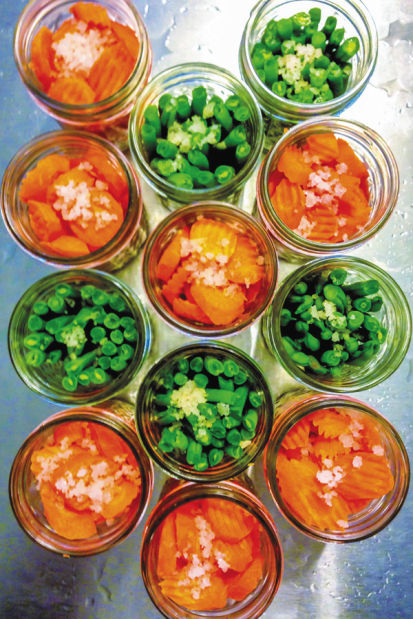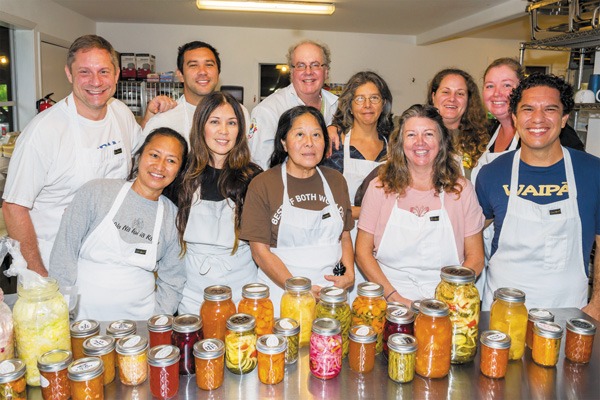“I view my job as helping small farmers become more sustainable so we stop relying on imports,” says Ken Love, a farmer who is on a doctor prescribed gluten-free, vegan diet. He’s also a former chef, former Associated Press photographer, the executive director for the Hawaii Tropical Fruit Growers and president of the American Culinary Federation in Kona. “Food preservation covers two important areas: Food security and food safety.”
Love, who stars in the documentary “Fruit Hunters” with actor Bill Pullman, is teaching the first Hawaii Master Food Preserver class on Kauai. Myself, along with 11 other students are learning how to safely preserve food, a technique that some believe is a lost art.
I remember my mother “putting up” tomatoes on steamy, late summer afternoons. Purple grapes that clung to her fence were made into jelly and a ceramic crock coaxed pickling cucumbers into crisp and tangy snacks.
Maybe preserving food is becoming a lost art because we can have any food, any time of year. Few of us have gardens and even fewer have the time to cook homemade meals, let alone spend an afternoon canning.
And that’s part of the problem. For generations, techniques for safely preserving food were passed down. Today, people crack open a cookbook and call it good. In July 2012, three people were hospitalized after eating beets that had not been canned properly and contained the botulism toxin.
Ken Love tailored the University of California’s Master Food Preserver course for Hawaii’s climate. Before students could take Love’s class, they had to pass a food safety certification test, which is a requirement on the Mainland for anyone in the food industry. Students spent eight, eight-hour days, learning from course materials, which were based on 100-years worth of canning research by the University of Georgia and the USDA.
On day one, we learned about food safety and controlling hazards that make food unsafe or unfit to eat. We learned the history of dehydrated foods, how to dry fruit, herbs and vegetables so mold won’t grow, and which drying techniques are best.
Each morning began with a quiz before we read a chapter from our textbook aloud, taking turns with each page. We were given two cookbooks and asked to select recipes. With farm fresh produce, we divided into three groups and made mulberry lime jelly, calamansi marmalade and tangelo marmalade.
We learned what pH level stops bacteria from growing and how to test for proper acidity. We used a pressure canner to preserve chicken and ahi; learned how to can low-acid foods such as tomato sauce and mango chutney; and canned carrots, cauliflower and green beans. A lesson on proper freezing techniques taught us how to eliminate freezer burn.
Chef Paul Heerlein, assistant professor coordinator at the Hawaii Community College Culinary Arts Program in Kona, taught a charcuterie class. With recipes as handouts, we learned how to make a delicate and lightly sweet ono gravlox. We ground pork and turned it into Italian sausage and made ravioli filled with chicken and shrimp hash.
Red and green cabbage was massaged with salt until it released its water, stuffed into a crock, and left to ferment for a month. We pickled colorful combinations of seasonal vegetables and learned how to develop, market and package value added products.
For our finals, we passed out handouts with recipes and demonstrated to our classmates how to preserve something, because the goal of the class is to pass this information on. On our last day, we took a 61-question test and each one of us became a certified Hawaii Master Food Preserver.
“Canning local food lessens the worry in cases of emergency, like after 9-11 when we were cut off for a few days,” says Love. “It gives us chemical-free food, which for me is another form of food safety. Buying products from a certified Hawaii Master Food Preserver mitigates some of the fears that people have about food safety and homemade products.”
For more information, email Ken Love at ken@mycoffee.net or Kalen Kelekoma at kalen@waipafoundation.org.
• Marta Lane, a food writer on Kauai since 2010, offers farm to fork food tours and is the author of Tasting Kauai: Restaurants – From Food Trucks to Fine Dining, A Guide to Eating Well on the Garden Island. For more information, visit TastingKauai.com






